Africa's militant Islamist groups
- Published
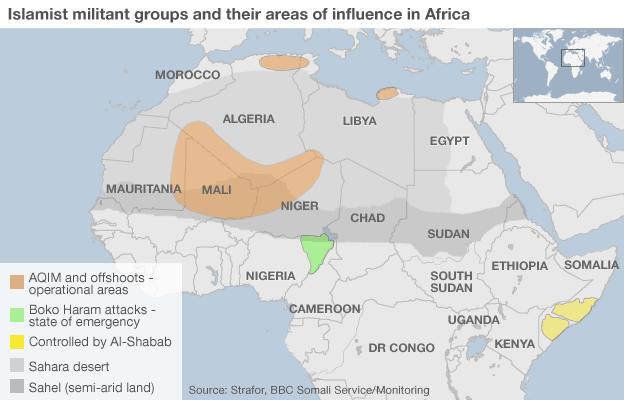
Islamist militant groups are active across the northern half of Africa - from Mauritania in the west to Somalia in the east - with Western countries, especially France and the US working with local security forces to counter them.
BBC Monitoring looks at some of the most prominent groups.
AL-SHABAB
The Somali jihadist group al-Shabab emerged from the ashes of another Islamist grouping, the Union of Islamic Courts, in 2006. Its leader, Ahmad Abdi Godane, maintains a tight grip over the group and has formalised its alliance with al-Qaeda.
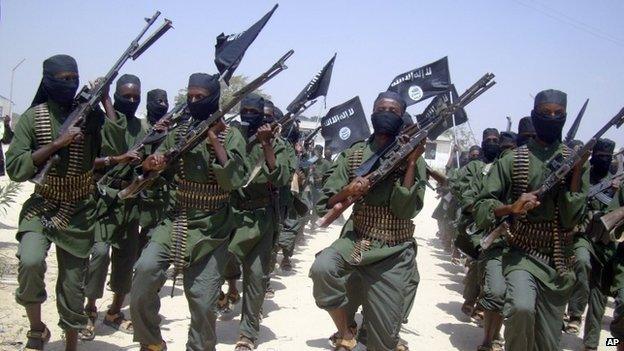
Al-Shabab has been forced out of Somalia's large settlements
It used to control much of southern and central Somalia, meting out harsh punishments based on Islamic law, such as stoning for adulterers and amputating the hands of thieves. It also banned radio stations from playing music and stopped local video halls from showing foreign football matches.
In the past two years, it has been forced out of most of the major towns and cities, such as Mogadishu and Kismayo. But it still carries out suicide attacks there, as well as in neighbouring countries, such as Uganda, where 76 people were killed in 2010 and the October 2013 attack on a shopping mall in Kenya, in which at least 67 people died.
It used to use radio and TV networks to present its propaganda in the form of domestic news reports, but its broadcast footprint waned in the wake of territorial losses. As a result, al-Shabab has increasingly been using the internet to convey its message. Its English-language output, particularly its use of Twitter, has demonstrated a level of sophistication unmatched by similar militant outfits, and reports suggest that it has proved an effective tool for recruiting Muslims overseas. The micro-blogging site allows al-Shabab to provide real-time updates which challenge official narratives on operations such as the attack on a UN compound in Mogadishu in June and the Westgate siege in Nairobi. The group has had a number Twitter accounts suspended, but regularly reappears under a new handle.
AL-QAEDA IN THE ISLAMIC MAGHREB (AQIM)
The oldest of the Islamist militant groups operating in North Africa, Al-Qaeda in the Islamic Maghreb (AQIM) came into being in 2005 when it changed its name from the Algerian Salafi Group for Call and Combat (GSPC) and announced its allegiance to Osama Bin Laden. The GSPC was founded in 1998 following the dismantling of the Armed Islamic Group (GIA) - the militant group that fought the Algerian government during the 1990s.
Abu Mus'ab Abdel-Wadood, also known as Droukdel, a former GIA fighter, became the group's leader in 2003 and since then has been organising operations in Algeria and in Mali.
Elements from AQIM were involved in clashes with Tunisian security forces in May 2013 in the Chaambi mountains on the Algerian-Tunisian border.
AQIM appears to have suffered a major blow following the defection of some of its fighters who went on to set up their own groups, most notably Mokhtar Belmokhtar, who masterminded the January 2013 In Amenas operation in Algeria.
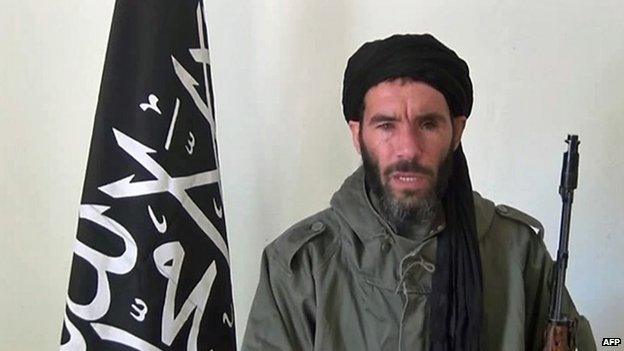
Mokhtar Belmokhtar left al-Qaeda in the Islamic Maghreb in late 2012 after falling out with leaders
AQIM SPLINTER GROUPS
In August 2013 two jihadist groups, Belmokhtar's "Masked Men" Battalion and MUJAO, announced their merger under the new name of El-Mourabitoun.
Masked Men and Signed in Blood Battalions
The "Signed in Blood" battalion was formed by Belmokhtar in October 2012, after his reported split from AQIM. Belmokhtar also continues to command the "Masked Men" Battalion he headed under AQIM. The two battalions were behind the May 2013 attacks in Niger and the siege at Algeria's In Amenas gas plant earlier in the year.
Documents found in the aftermath of the defeat of militants in northern Mali suggest a conflict between the Algerian militant commander and the AQIM leadership was behind the split. Belmokhtar had previously been involved in multiple kidnappings and hostage takings, which may have increased his financial ability as a commander, and helped him to recruit and to organise the In Amenas operation. Some reports have said he has been spotted in Libya.
The battalions have released a number of statements to Mauritanian media outlets, and also use jihadist websites to broadcast their message.
MUJAO
"The Movement for Monotheism and Jihad in West Africa" (MUJAO) was formed in late 2011 and came to prominence in April 2012, when it joined two Tuareg groups, the National Movement for the Liberation of Azawad (MNLA) and Ansar al-Din, in seizing control of northern Mali. MUJAO controlled the town of Gao between April 2012 and January 2013.
Based in northern Mali, this AQIM offshoot is made up mostly of Arabs from Mali, Niger and Mauritania. Its founding members hail mainly from AQIM's Mauritanian contingent. Its leader, Hammad Ould Mohammed al-Khayri, split from AQIM to promote jihad and establish the rule of Sharia (Islamic law) in West Africa.
The group was behind the kidnap of Algerian diplomats in Mali in 2012.
'The Sons of the Islamic Sahara Movement for Justice'
This group split from MUJAO in May 2013 and reportedly works in northern Niger, western Libya and south-eastern Algeria. Algerian sources say the group is made up of Libyans, Algerians and Malians. It is reported to have carried out attacks against Algerian gendarmes.
As with Belmokhtar's Signed in Blood, MUJAO seems to prefer Mauritanian media sources to communicate its messages to the world.
BOKO HARAM
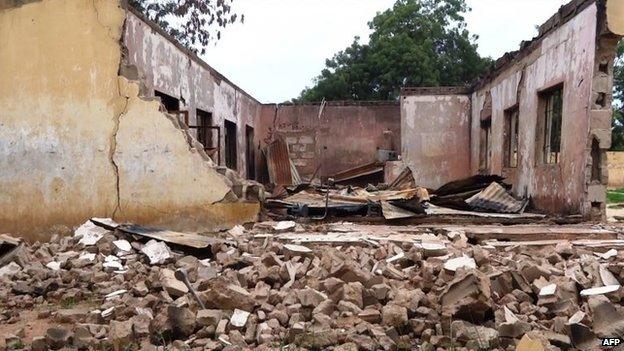
This Nigerian student hostel was blown up in August 2013, killing dozens
Boko Haram, whose name can be translated as "Western education is forbidden", is led by Abubakar Shekau, a hardline cleric who, on a number of occasions, has been reported killed.
Most of the attacks attributed to the group have targeted police stations, churches, schools and other educational institutions.
There was speculation that after the Islamist takeover of northern Mali in early 2012, Boko Haram sent militiamen to fight along side MUJAO. But there has never been any conclusive proof of this.
A Nigerian jihadist group, Ansar al-Muslimin in the Lands of the Blacks (JAMBS), is thought to have been founded following a split from Boko Haram. Also referred to as Vanguards for the Protection of Muslims in Black Africa, or simply Ansaru, the group has claimed the taking and killing of a number of hostages.
ANSAR AL-SHARIA
Several groups using the title Ansar al-Sharia have emerged across the Arab world since 2011. Two prominent examples appeared in Libya and Tunisia, exploiting the disappearance of restrictions which were imposed on Islamist groups by the ousted governments of Zine al-Abidine Ben Ali in Tunisia and Muammar Gaddafi in Libya.
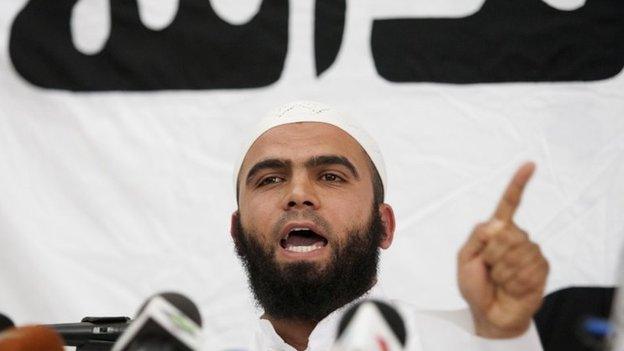
Ansar al-Sharia used to operate openly in Tunisia, providing social services
Ansar al-Sharia in Tunisia
In the summer of 2012, several anti-US protests in Tunisia brought Ansar al-Sharia's supporters into open confrontation with the security forces. Following the assassinations of two secularist politicians in Tunis, and an ongoing security operation in Tunisia's Chaambi mountains, the government declared the group a terrorist organisation in August 2013.
Ansar al-Sharia in Tunisia has established a vibrant internet and social media presence with websites, and Facebook and YouTube accounts.
The group's leader - "Sayf-Allah ben Hocine" (aka Abou Iyad) - is currently wanted by the Tunisian authorities. He spent eight years in jail on terrorism-related charges, has been in the UK and is reported to have fought in Afghanistan.
Ansar al-Sharia in Libya
Ansar al-Sharia in Libya hit the headlines when the American ambassador to Libya was killed in Benghazi in September 2012.
The group has several brigades in Libya. In the eastern city of Benghazi the group is commanded by Mohamed al-Zahawi. When the Benghazi group held a conference for its sympathisers and affiliates in June 2012, more than 1,000 people attended. They included Sufyan bin Qamu, the commander of Ansar al-Sharia in Derna in eastern Libya, who, according to the London-based Al-Quds al-Arabi, is wanted in relation to the attack that killed the US ambassador in Benghazi. The former Guantanamo detainee survived an alleged attempt on his life in April 2013.
BBC Monitoring, external reports and analyses news from TV, radio, web and print media around the world. For more reports from BBC Monitoring, click here. You can follow BBC Monitoring on Twitter , externaland Facebook, external.
- Published29 May 2013
- Published30 May 2013